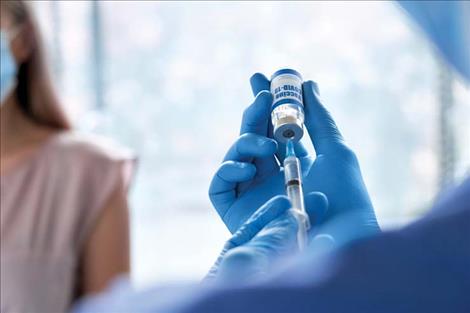Lake County exceeds state average in vaccinations
Hey savvy news reader! Thanks for choosing local.
You are now reading
1 of 3 free articles.
Confederated Salish and Kootenai Tribal Health’s new mobile medical van was parked across from Super 1 in Polson Friday, offering free walk-in COVID-19 vaccinations. A pair of 18-year-olds stopped by to get their first installment of the Pfizer vaccine as a pre-college precaution, and a 14-year-old waited in the car with his mom to make sure he had no reaction to the shot. “It didn’t hurt as much as I thought,” he said.
Inside the van, Char Hunter and Ellen Kaphammer, RN, waited for customers and were poised to give free shots of either the two-dose Pfizer vaccine (now available for ages 12 and older) or the one-dose Johnson and Johnson vaccine.
During their Friday stint in Polson, they had given about six shots. Tribal Health has averaged up to 60 vaccinations per week on the reservation recently, and reports an increase in the 12-17-year-old population (minors need a signed consent form from their parent or legal guardian).
“Our goal now is to travel to people,” says Kaphammer. They had just completed what she calls “the grocery store tour,” taking the van to store parking lots in St. Ignatius, Ronan and Pablo.
Businesses that want to make vaccines more accessible to employees are also encouraged to sign up for a van visit. “If they want us, we’ll come to them,” she says.
To reach the much-touted herd immunity, the goal is for 70 percent of the county to get vaccinated. Right now, around 48 percent are fully vaccinated, well above the statewide average of 42 percent, and higher than most other counties in the state (Missoula is highest at 54 percent).
Kaphammer hopes that with education and time, more people will realize vaccines are safe and opt for the shot.
Lake County Public Health Director Emily Colomeda, RN, echoes that sentiment. “I would like to acknowledge those who have already gotten vaccinated, and encourage those who are not to talk to their healthcare providers and learn more about the vaccine if they are hesitant,” she says. “The more people who are vaccinated, the more difficult it is for the virus to be transmitted, and the more communities are protected.”
From a public health perspective, she notes, it’s impossible to predict the severity of symptoms in individuals who get the virus. “We have seen otherwise very healthy patients end up hospitalized or continue to be impacted by COVID even months after their ‘recovery.’ Even those with mild disease report long-term effects such as ‘brain fog,’ continued diminished taste and/or smell, fatigue and low stamina,” she says.
“Getting vaccinated is a far safer way to build protection from COVID than getting the disease,” she adds.
Fully vaccinated individuals are also apt to be safer as summer gatherings and events resume. “I think, for the most part, fully vaccinated people can feel relatively safe participating in most activities this summer,” says Colomeda.
However, she urges those with compromised immune systems to remain vigilant, even if they are fully vaccinated. “Everyone should know their level of risk – vaccinated or not – and take the proper precautions to protect themselves and those around them.”
The health department reported on May 19 that among 41 active cases of COVID-19 in Lake County, two were identified as fully vaccinated people. In a Facebook post, Lake County Health Officer Megan Vigil helped shed light on these so-called “breakthrough” cases.
The family physician points out that two factors may be at play. It takes at least two weeks after the second vaccine for most of us to develop an adequate immune response to the virus, or the person may have been infected with a variant (although current data suggests that available vaccines protect against most variants).
She also notes that no vaccine is infallible (Pfizer and Moderna are 94-95 percent effective and Johnson and Johnson is 66 percent).
“That being said, getting the vaccine is important because it reduces the chance of contracting the virus and, if one does contract the virus, it reduces the chance of serious illness from the virus,” writes Vigil. “Every person’s immune system is slightly different. Research is underway to see if there is any pattern among breakthrough cases, but no pattern has been detected so far.”
To find a vaccine clinic, visit mtreadyclinic.org and insert your zip code. Currently, Credena Pharmacy (at Super 1), Walgreens, Walmart, and Mission Drug (St. Ignatius) are all approved vaccine providers as well as St. Joseph Medical Center (coronavirus.providence.org/covid-vaccine) and St. Luke Community Healthcare (stlukehealthcare.org/covid-19/).
Tribal Health continues to offer vaccines to people 12 years and older at the Salish Kootenai College gym on Thursdays, and via the mobile clinic (www.cskthealth.org).
Providence (406-883-5680) and St. Luke (406-676-4441) each offer COVID-19 testing as well, and Colomeda points out that it’s still important to get tested if COVID is suspected.
As of Saturday, May 29, the Montana Department of Health and Human Services had posted 34 active cases and 36 deaths from the virus, out of 2,115 confirmed cases. To track vaccines and COVID-19 cases in Lake County, follow Lake County Public Health’s Facebook page; for local and statewide data, visit dphhs.mt.gov/publichealth/cdepi/diseases/coronavirusmt.

















